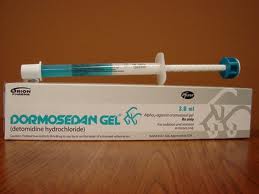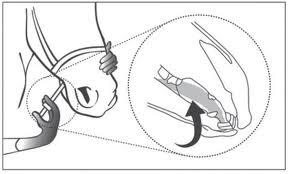 Once in a while we have a new product come along that really seems to make sense. The Pfizer Company has developed a new formulation for the popular sedative Dormosedan Detomidine). As many of you know Dormosedan is a very powerful tranquilizer. When given by the intravenous and intramuscular route it results in profound sedation that can enable many procedures to be performed. But not all horses are happy about receiving an injection and some can be downright dangerous.
Once in a while we have a new product come along that really seems to make sense. The Pfizer Company has developed a new formulation for the popular sedative Dormosedan Detomidine). As many of you know Dormosedan is a very powerful tranquilizer. When given by the intravenous and intramuscular route it results in profound sedation that can enable many procedures to be performed. But not all horses are happy about receiving an injection and some can be downright dangerous.
The new Dormosedan Gel is given by mouth. The gel is placed under the tongue. The horse is given 30-40 minutes for the drug to take effect. The new gel formulation was shown to be beneficial for many routine tasks such as shoeing and clipping. For horses that are very needle shy the owner may wish to pre-medicate with this product ahead of a scheduled visit to make vaccine administration easier and safer.
There are a few particulars you should know.
* 1. The drug is given sublingually (under the tongue). If the horse swallows the  drug rather than letting it slowly absorb it will not have any effect. Food and water should be removed from the stall until after the horse has fully recovered.
drug rather than letting it slowly absorb it will not have any effect. Food and water should be removed from the stall until after the horse has fully recovered.
* 2. The same side effects that can occur with the injectable formulation can occur with the oral formation.
* 3. If you get the product on your hands you should wash your hands immediately.
* 4. The drug is metabolized by the liver and should only be given to healthy horses.
* 5. Decreases in the heart & respiratory rate are expected, horses with cardiac or respiratory disease may not be good candidates for this product.
Source: Central Georgia Equine Services